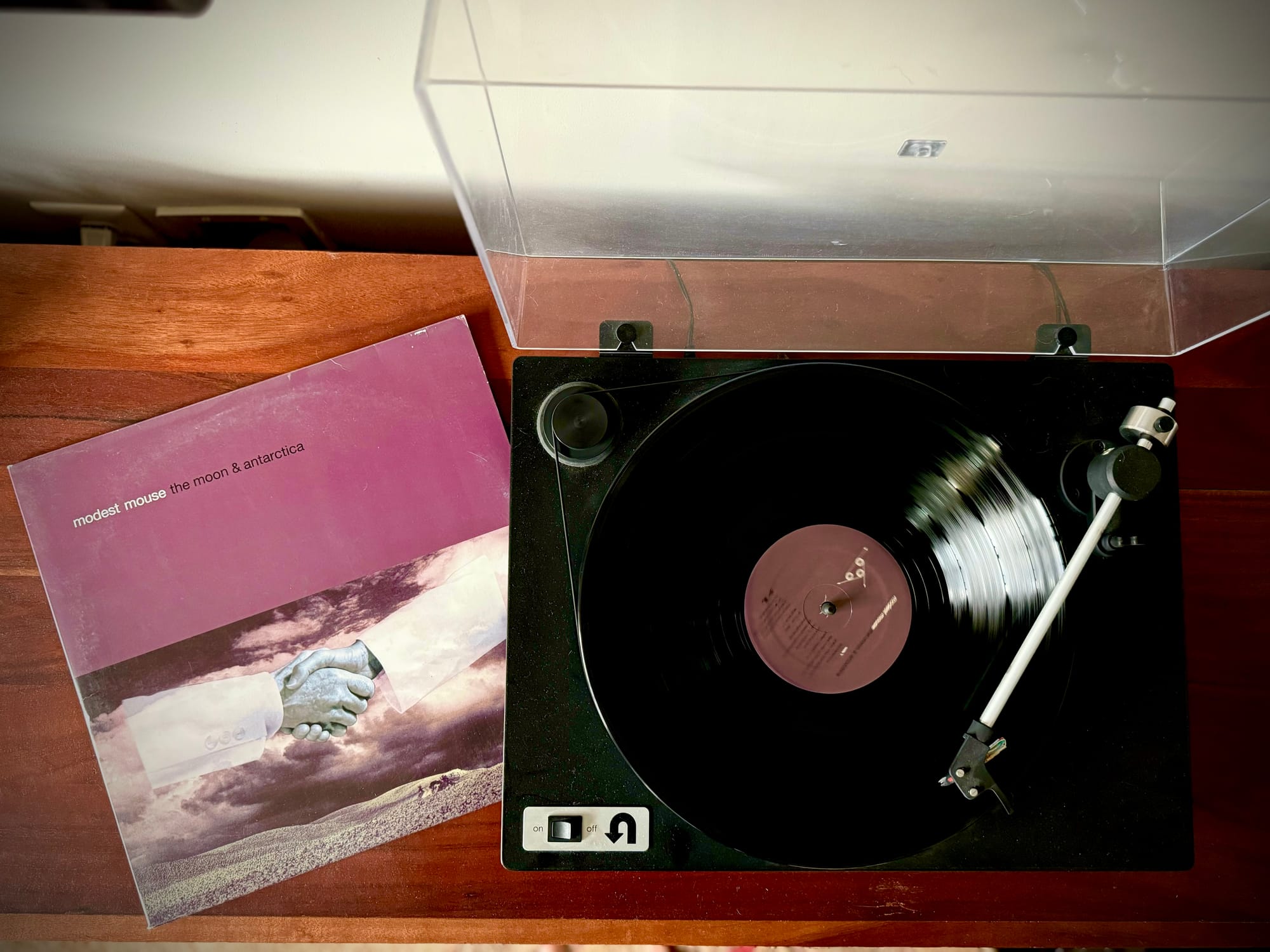OTR, Take 57: Modest Mouse - The Moon and Antarctica

Please do yourself a favor and listen to this one. Tidal or Spotify.
And in the faces you meet, you'll see the place where you die
During my discussion with Chris Sellers in the most recent episode of Sonder Union, we got to a place that was one part very dark and another part hopeful survival story. We spoke of our fathers and our parents' expectations, the way we felt both stifled and somehow free because of this. In some senses, we felt that those expectations helped inform the revolt at the center of our lives.
I've been thinking a good bit about this since we taped last week, wondering not only to what extent the concerns, personality, and drives I have make sense only in relief to the expectations set for me. That's the thing about revolt, isn't it? It's reactive. I love to go back to the roots of these words because the words so often tell on themselves. Revolt and revolution are from the Latin: re-volvo. The easiest way to think of it is to turn in a circle and reach the beginning.
That's the joke of most revolutions, right? The successful revolution almost inevitably reinstantiates a version of what came before it. (For my pop-culture-infused friends, this is the lesson of The Hunger Games.) The trick is to rebel without revolting. Perhaps this seems like pointless semantics to you – and it may well be – but welcome to my broken brain.
Nevertheless, it leads me inexorably to this quandry: how best to provide values and frameworks for McNugget without forcing him into my dreams for him? I've often though that I am unwittingly a master character actor, playing roles that have been foisted on me. More than anything else, it was important to my dad that I was smart...so I learned to play that part. While that may sound silly – one is or isn't smart, you might mistakenly think – it's not hard to conjure images of what a "smart person" looks, acts, talks, and thinks like. I may have wound up a fun-house mirror version of the part I was raised to play, but I would be lying if I said there isn't a significant part of my thoughtless (I don't choose words accidentally) presentation to the world. It's become internalized. I give you Kurt Vonnegut:
We are what we pretend to be, so we must be careful what we pretend to be.
Everyone's life ends, but no one completes it

In college, I discovered three bands that hit me hard and changed the way I thought about music then and that remain permanent members of the weekly-listen club. There aren't that many musicians in that club, so for three to have been a massive influence when I was young and dumb and still hold my esteem is pretty unusual. Those bands are Built to Spill, Jimmy Eat World, and Modest Mouse. I've written about Jimmy Eat World before, but haven't written about BtS or MM. I almost wrote about BtS's There's Nothing Wrong With Love this morning, given that it reached it's 30th anniversary just over a week ago, but the topic and tenor of that record doesn't suit what's on my mind.
The Moon and Antarctica is not my favorite Modest Mouse record (it may well be my third favorite), but it is undoubtedly the only perfect record they've released. And, boy, is it a mood.
From the very outset, as the gentle plucking of "3rd Planet" woozily breathes life into the album, we get a sense for what is in store. The very first line of the album – "Everything that keeps me together is falling apart" – encapsulates the entropy-driven, death-obsessed theme of the record. Again and again, Isaac Brock speaks to, interrogates, and falls prey to the inevitable truth of life: it is an incurable condition. It eventually gets you.
Laugh hard, it's a long way to the bank
The Moon and Antarctica wasn't exactly a clean break or a brand new sound for MM when it debuted in 2000. It has many of the hallmarks that the band developed over the previous five years, but Modest Mouse managed to pull off the rare magic trick of signing to a major label and using that money to transform not into a stadium-sized parody of itself but into a band more adventurous and willing to expand its sonic palate.
MM's first two records, This Is a Long Drive For Someone With Nothing to Think About and The Lonesome Crowded West, both comfortably fit into my 25 favorite records – with The Lonesome Crowded West easily in the top 10 and perhaps top 5. They are rough, dirty, heart-on-the-sleeve rollicks through the wastelands of the pacific northwest. Isaac Brock was in his Old Testament prophet mode, shouting truths at full yelp into the air as people walked by pointing at the weirdo saying crazy shit.

Modest Mouse's first two records were polarizing, and I was one of those with the antenna that dialed right in. I heard them with perfect reception from the moment I first listened to "Trucker's Atlas." Part of their sound was a sense that everything was this close to going off the tracks, crashing to a halt with a great, terrible din. That was the trick of it: they sounded like they were out of control, the music projected messages that were on the edge, they looked like they were barely holding it together – and they walked that high wire while flailing their arms around.
And then came The Moon and Antarctica, something different in kind, oddly assured and confident in feel, even if the lyrics were less certain and more probing. There is no other album in MM's oevure that is anything like it.
It's hard to remember to live before you die
On my first day of grad school, I sat down in a Contemporary Lit class with a number of new and established students. Professor Strehle asked us all to introduce ourselves and say what we were interested in. Everybody was quiet at first, so after about 30 seconds, I jumped in and introduced myself. When I said what I was interested in, I mentioned that I played guitar, liked to design websites and code backend applications, and loved Notre Dame football. We proceeded around the room with people sharing things about them as people.
After we were done, Prof Strehle said, "Fascinating. That's the first time in twenty-five years doing this that the class introduced themselves through things other than saying they loved literature. Owen, why'd you lead how you did?"
"I just figured all of us love to read. Why else would we be in a graduate program for English literature?"
It's very easy to fall into well-trodden paths. Ready-made lives. These are the most treacherous paths, for two reasons. First, they were not blazed by or for you. Second, it's nearly impossible for life to live up to their promise. Why are so many people disappointed by marriage or romance? The stories we've been told about them as children are fantasies, and the real-life experience doesn't match. It doesn't matter that the lived version is deeper, more profound, and richer than the superficial bullshit fed to us – it's not what we expected and it can be hard to learn to appreciate it for what it is.
Fitting into these roles, these ready-made parts, is something a little less than living. Perhaps that's a too-harsh and judgmental way of putting it. It leads to a life unfulfilled, a life that lacks the magic of what only you can bring to it.
I think back to how easily I adopted the guise of "smart" to fulfill other people's wishes for me and wonder what would have happened if I was rewarded for different things. And this seems, now, like an overwhelming responsibility.
How is one to instill values and virtue without laying out a ready-made costume for a child who doesn't know any better?
Everyone wants a double feature
The centerpiece of The Moon and Antarctica is "The Stars Are Projectors," an absolute monster of a song.
It is literally at the mid-point of the album and demands attention for its virtuosity. But I don't think it's the emotional heart of the record. "3rd Planet" gets the album rolling with big, expansive questions and the middle of the album plays with and expands on these themes. It's the last three tracks, though, that hold the key to the album.
"Lives" is a song that stops me from doing whatever I'm doing each and every time it comes on. When I was listening to it this morning, I was also feeding McNugget, and I lost track of what I was doing. Near the end of the song, I noticed that my hands were wet and sticky with milk. I'd let the bottle fall out of his mouth and he threw up on me. It took me minutes to notice, because this song took me elsewhere.
Everyone's afraid of their own life
If you could be anything
You'd be disappointed, am I right?
That line is not as straightforward as you might think. If we could be anything! Man, I remember being told as a kid that I could be anything and that seemed like too much: I didn't want to be anything I wanted to be me.
It's hard to remember, it's hard to remember
We're alive for the first time
It's hard to remember we're alive for the last time
And yet here we are, making it up as we go in this live-action play without rehearsals, figuring out our character and lines on the spot. Good god.
"Lives" and "Life Like Weeds" brings to bear that in our own mortality, meaning is derived from and provided to other people. "In the faces you see you'll see just who you've been." In a life that is so easy to spend defining and seeking yourself, we find ourselves not in a mirror, but in the faces of those we've impacted. In those who love us because of the person we are as opposed to the person we've tried to be.
I hope McNugget understands that. That I will love him not because he's smart, or a lawyer like daddy, a doctor like mommy, a great sports star or a plumber – I will love him forever because of how he's already impacted me and what I have learned about myself from looking in his eyes.
And I hope he learns the final, unbearable, and true final message given on this album. The final track is titled "What People Are Made Of." The answer is humbling and grounding, providing wonder in the fact that we've managed to create so many beautiful things.
They ain't made of nothin' but water and shit.
A final programming note: those of you who have signed up for the newsletter received a short announcement earlier this week about a new project. For anybody who has read this far and hasn't submitted your email, really: now's the time.
OTR will be announced bimonthly on LinkedIn, as usual, but the new project will be mostly just kept to subscribers.
Go on, I'll make it worth your time.
Member discussion